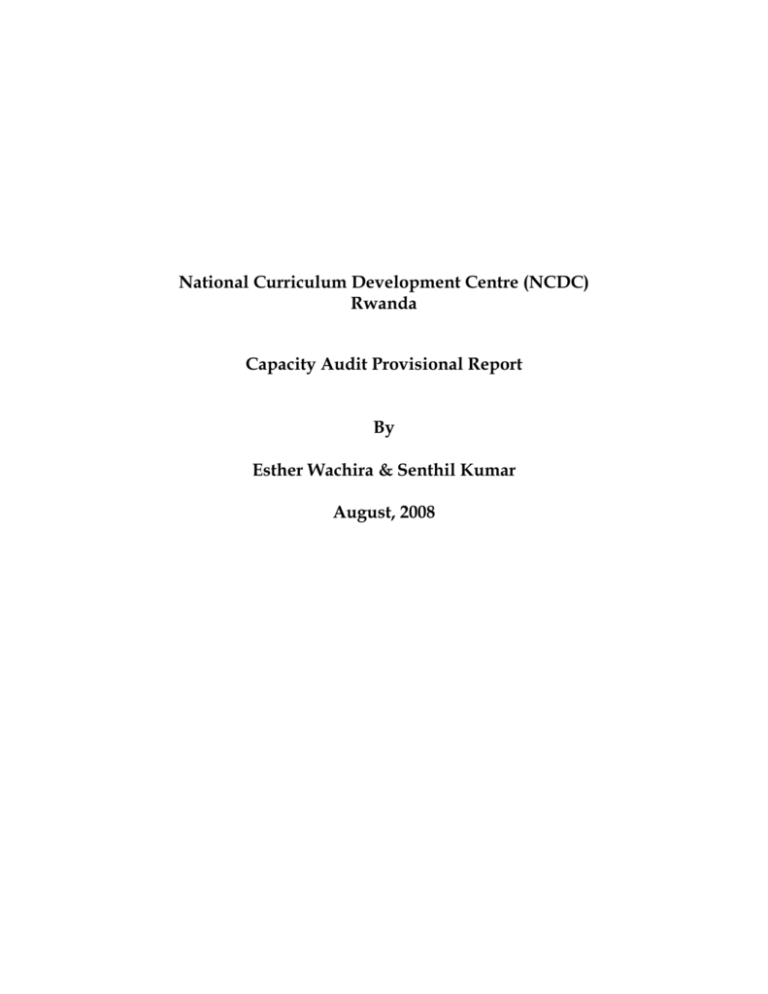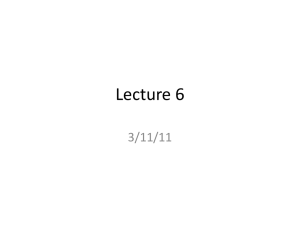Background
advertisement

National Curriculum Development Centre (NCDC) Rwanda Capacity Audit Provisional Report By Esther Wachira & Senthil Kumar August, 2008 Background The National curriculum development centre (NCDC) is charged with the responsibility of developing quality curricula for pre-primary, primary and secondary schools in Rwanda. It is also responsible for preparing teachers’ guides and other pedagogical materials in accordance with MINEDUC policies and plans with specific reference to the curriculum development policy. This it does in cooperation with other MINEDUC departments and institutions and other non-MINEDUC partners. NCDC is currently organized in six departments; the Science and Arts department, Language and Humanities, Vocational and professional department, Pedagogy and Production department, Finance and Human resource development and the ICT Unit. Each of these departments is headed by a director who report s directly to the NCDC Director General. Each department, except for the ICT section, has several curriculum developers. In total NCDC is staffed with 80 curriculum developers, among others, all of whom are trained teachers and have had a teaching career for a period of not less than five years. Introduction This document is a provisional report which as been compiled for the purpose of providing some background information before the digital content evaluation workshop that has been planned that will take place between 8th and 12th September 2008. A full report will be provided after this workshop based on the activities that will be carried out during the workshop and the feedback that will be received from all the curriculum developers. The findings herein are based on a visit that was made to NCDC between August 18th and 22nd 2008 by Esther (eLearning specialist) and Senthil (Country Programme Facilitator). During the visit, the following personnel were interviewed; The NCDC Director General, the Departmental Directors in Science and Arts, Languages and Humanities, Pedagogy and Production and the ICT unit. Each director appointed 3 curriculum developers who were also interviewed in a focus group and who also gave an indication of the skill sets available in NCDC. Hence, only 12 out of the 80 curriculum developers were interviewed during the visit. However 60 other questionnaires were left with the curriculum developers and will be collected between 8th and 12th of September 2008. Once these are collected it will be possible to provide a more comprehensive report. Compiled by Esther Wachira & Senthil Kumar 2 Objective On the one hand, the Ministry of Education (Rwanda) has in its custody digital content from a number of organizations. These organizations have approached MINEDUC with a goal of having the content used in Rwandese primary and secondary schools. According to good practice, it is necessary to have this content subjected to a review process to ensure that it is aligned with the country’s educational and curriculum objectives, supports the values and the norms that should be propagated by the education system in the country and that it is in line with the existing educational philosophy. On the other hand, 299 Rwandese Secondary schools have already been provided with computers. These computers have no digital content that can be used to promote the curriculum goals. A further large scale pilot of 5000 ‘One Laptop Per Child’ (OLPC’s) are currently with the Rwanda Information and Technology Authority (RITA) and have no digital content. These, it is hoped, will be deployed in primary schools in the month of September 2008. Clearly, there is an urgent need to have digital content available for use with these computers. It is against this background that GeSCI was asked by MINEDUC to facilitate the evaluation of the digital content in its custody for use in the schools. Before carrying out the digital content evaluation exercise it was deemed necessary to: Understand the existing print content evaluation framework within NCDC and see how this can be used to evaluate the digital content before it is dispatched to the schools. This is envisaged to be done by the various curriculum developers within NCDC according to their subject specializations. Audit the available human and resource capacity for the content evaluation exercise Understand NCDC’s current and projected plan for digital content evaluation, customization and development. Methodology (state the objective of focusing on each group) The findings provided in this report were collected through the use of: Questionnaires, Interviews Observations One focus group comprising of 12 curriculum developers who were randomly sampled and interviewed during the visit. Compiled by Esther Wachira & Senthil Kumar 3 Findings and observations NCDC Director General Findings from the NCDC director indicate that he is completely supportive of digital content evaluation, customization and development. He also underscored the role of NCDC in providing the appropriate digital resources to supplement the existing print material. However, he highlighted a wide lack of understanding among the curriculum developers of the role they should play in the development of this content. Further, he noted, there is not only a lack of skills in this area but a high level of misunderstanding of what digital content is all about. The existing content evaluation framework for print materials is such that, whenever there is a need to evaluate the said content, a team is normally convened depending on the subject matter. This team is derived from the relevant departments depending on the task at hand. As such, there is no standing committee whose function is to evaluate content. His view was that the same approach should be adopted in evaluating digital content. However for this to be actualized, all the curriculum developers within NCDC need to be sensitized and exposed to the various aspects of digital content development from a very basic level. The skills and understanding of what digital content is about are widely missing. The misunderstanding is made clear by the fact that curriculum developers at the moment view the digital content evaluation exercise as a function of the ICT unit. Departmental Directors Every department has been assigned one person in the ICT unit who should be responsible for the digitization of content. This means that the technical persons in the ICT unit have some pre-designed roles in the Languages and Humanities, Science and Arts, Vocational and Professional training. The following are the highlights from the Directors. The departmental Directors interviewed felt that digitizing of content is the work of the technical team but they do not have the requisite skills to actualize this. There was clearly a lack of communication between the Ministry of Education and the NCDC in terms of what is currently happening, action plans and the current policies within MINEDUC in the area of digital content. The Directors registered a wide lack of understanding of what content development, evaluation and customization entails. NCDC staff had never attended any of the GeSCI workshops except for 3 persons from the ICT unit. Compiled by Esther Wachira & Senthil Kumar 4 In the Pedagogy and Production department (which is charged with the development of teaching aids and models for all the schools), the director indicated that he was very strained in carrying out his tasks. This is because the development of these models is expensive and their distribution equally has heavy financial implications. Consequently he has a plan to train teachers in the schools on how to develop their own teaching aids. He recognizes the role that animated diagrams and simulated scenarios could play as effective teaching aids while at the same time going round the cost incurred in the distribution of such. Further, the digital teaching aids would easily be re-used. The Directors in the Science department did acknowledge that most of the science subjects are taught theoretically as the laboratories in the schools are widely un-equipped. Director General of inspectorate He was very supportive of the content evaluation exercise and would like to identify subject matter experts for this workshop. He mentioned that the Inspectorate is currently highly decentralized in Rwanda. Hence he has to identify the suitable talent associated with this content evaluation exercise. Further, he noted that he has been specifically focusing on providing academic and pedagogical inputs as a function of the inspectorate as opposed to the administrative monitoring which characterized most of the inspectorate’s work in the past. He underscored the need to build capacity among teachers in the use of e-Learning content and making it widely available in the Rwandese schools. Curriculum developers 12 respondents were interviewed from the three departments: Science and Arts, Languages and humanities, Pedagogy and Production. Questionnaires were distributed to the remaining 60 curriculum developers. As a result details on the capacity skills among this target group will be more comprehensively analyzed in the final report. However, there are a few indications: The staff in the ICT unit have no pedagogical skills as they are computer science graduates The staffs in the pedagogy and production department are also technical persons, are functionally more of machine operators and have no pedagogical training. It is also worth noting that this department plays a central role like the ICT unit in that it produces teaching aids and models for teachers for use in all the schools. It was reported that all the staff in NCDC have basic ICT literacy skills but again these are at varying degrees. This factor is important as the computer will be the medium of communication during evaluation. However, they can comfortably use a computer and each of them is equipped with one. Compiled by Esther Wachira & Senthil Kumar 5 The skills in Multimedia are at best rudimentary with a higher number of respondents indicating that they do not have these at all. A general understanding of the digital content development is lacking among the curriculum developers. The Curriculum developers have varying proficiencies in the use of the English Language. This is an important factor as all the content to be evaluated is in English. More than 75% of respondents indicated that they can read, write and speak English, 25% can read and write. Compiled by Esther Wachira & Senthil Kumar 6 ICT department This department is largely non-functional. There are five personnel in this department with a lot of theoretical background. 7 computers are available in the computer room with two of these being non-functional due missing hard disks and RAM (Random Access Memory). They have no speakers and multimedia functionality. It was also clear that the staff in this department did not have technical maintenance skills. The computers are maintained through a contractual agreement with Computer Byte Limited. The ICT director indicated that there is no budgetary allocation for the many functions that the department is expected to perform within NCDC and they have to write funding proposal s for any capacity building activities or any other activity. Conclusions and Recommendations Based on the above preliminary findings, review of the digital content evaluation workshop programme should include: Sensitization and creation of a better understanding of what content development is about. This should include a session on the steps of digital content development Develop a project plan for any perceived activities in NCDC in relation to digital content as this is non-existent. Project management skills are also absent. If a project plan would be developed, project management skills should also be inculcated. Policy and plans from MINEDUC are not communicated to NCDC and at some point we were almost like informants. There is a need to develop a capacity building plan for the NCDC staff for digital content development, evaluation and customization There is a need to convene all the curriculum developers and sensitize them on their role in content development and how they can/should work with the ICT and the Pedagogy/Production units to address issues related to digital content. A criterion should be provided for the selection of those who will participate in the content evaluation exercise. This should span pedagogical skills, language proficiency skills, ICT literacy skills and subject matter expertise. There is a need to develop a profile for the ICT unit in terms of the requisite skills required for content development if the department is to be functional. There is a need to work with the team in costing content development as the figures in the proposals were indicated through guess work without any rationale. It was noted that most of the practicing teachers may have challenges in the English language; consequently a recommendation was made by the Compiled by Esther Wachira & Senthil Kumar 7 departmental directors of the different subject areas that we should co-opt the teachers who are usually involved in the setting marking of the national examinations as these would also play the dual role of representing the examination council and that of subject matters expertise from a practicing teacher’s point of view. Given the lack of skills in many respects within the domain of content development, one digital content evaluation workshop will not be enough, but it should serve the purpose of creating a suitable environment for digital content evaluation to be followed by more intensive evaluation exercises which should be developed conjunctively with NCDC. There will definitely be a good reason to outsource personnel in content development, customization and evaluation for NCDC if it is to actualize its dream of providing digital content in the Rwandese schools. Compiled by Esther Wachira & Senthil Kumar 8





